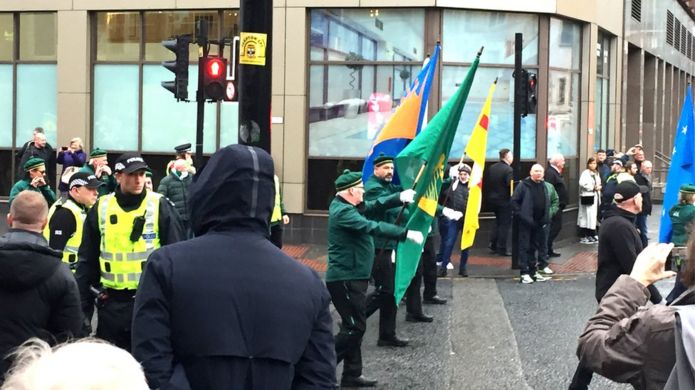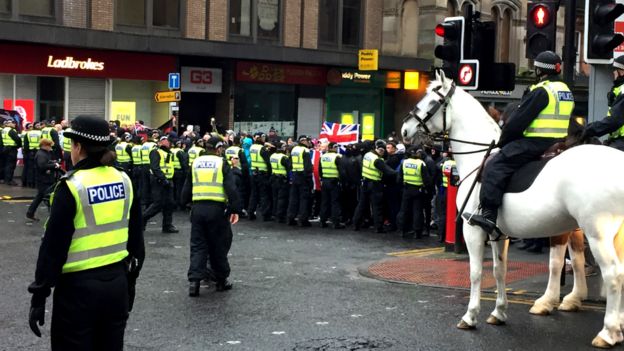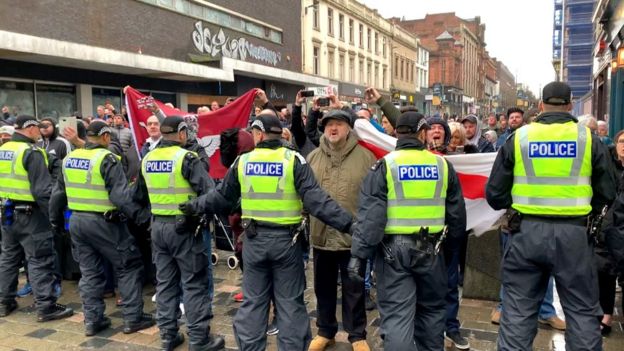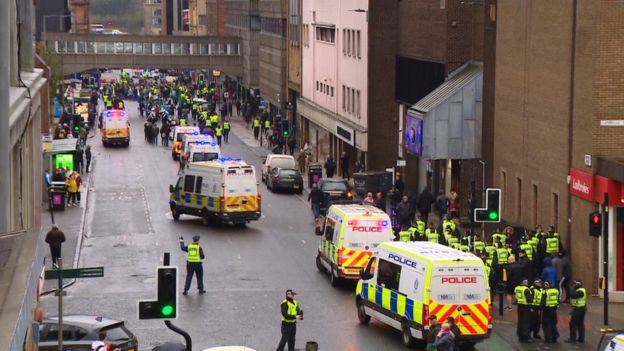Glasgow - People Before Processions

Glaswegians had to put up with yet another procession through the city centre the other day, as an Irish Republican band exercised their right to march and protest - only to be met by an angry group of Ulster Loyalists who wished to block their route.
Now the issue for me is not whether people have the right to organise a procession or protest, but about how they wish to organise the event - and whether there is any need for this event to disrupt the lives of fellow citizens in Glasgow city centre.
So it seems to me the solution is to find a sensible way of allowing to exercise their right to freedom of assembly while recognising the rights of other citizens to go about their normal business.
In which case the licensing authority (Glasgow City Council) should consider re-routing these events to one of Glasgow's many public parks - Bellahouston Park, Botanic Gradens, Glasgow Green, Kelvingrove Park, Maxwell Park, Pollok Park, Rouken Glen Park, Tollcross Park, Victoria Park - spring to mind, for example.
Because in these lovely green Glasgow spaces the marchers could march up and down to their hearts content, for an hour or so, without disturbing the rest of us and our own rights as citizens.
Amen.
https://www.bbc.com/news/uk-scotland-glasgow-west-51249978
Two arrested during Republican march and Loyalist protest in Glasgow

Image caption - The parade was organised by the West of Scotland Band Alliance
Two people have been arrested and a police officer injured after a Republican march was met by a counter-protest Loyalist group in Glasgow.
The parade, organised by the West of Scotland Band Alliance, was temporarily halted three times in the city centre.
It was held to mark the anniversary of Bloody Sunday, when 13 people died after British soldiers opened fire on demonstrators in Derry in 1972.
The National Defence League had urged loyalists to block the Glasgow march.
Two people have been arrested and a police officer injured after a Republican march was met by a counter-protest Loyalist group in Glasgow.
The parade, organised by the West of Scotland Band Alliance, was temporarily halted three times in the city centre.
It was held to mark the anniversary of Bloody Sunday, when 13 people died after British soldiers opened fire on demonstrators in Derry in 1972.
The National Defence League had urged loyalists to block the Glasgow march.

Image caption - There was a significant police presence as counter-demonstrators met the parade

Hundreds of police officers on foot and horseback tried to maintain order and separate members of both groups.
Police said they dealt with minor disorder, including the throwing of missiles which resulted in an officer being injured.
Can Glasgow ban all marches over sectarian fears?
Sturgeon condemns 'sectarian' disorder in Glasgow
Recent marches have sparked safety concerns after a full-scale riot in Govan last August, when a march by a Republican flute band was met by hundreds of Loyalist demonstrators.
A police officer was also injured following two Republican marches and subsequent clashes with Loyalist protesters in September.
'No significant incident'
Glasgow City Council had expected about 200 people to take part in Saturday's march.
An estimated 50 Loyalist supporters were anticipated to disrupt proceedings.
Glasgow City Council had expected about 200 people to take part in Saturday's march.
An estimated 50 Loyalist supporters were anticipated to disrupt proceedings.

Ch Supt Mark Hargreaves said: "We can confirm that the procession concluded at its destination shortly after 1pm without significant incident.
"Officers dealt with minor disorder, including missiles being thrown, which resulted in minor injury to a police officer.
"The procession was stopped a number of times as a result of protest activity to mitigate any further incidents, ensure the safety of all persons involved, and the wider community.
"Two people have been arrested for minor disorder offences."
People Before Processions (11/09/19)

The Evening Times had an interesting article the other day which suggested that Glasgow's politicians are having a fresh look at the impact of 'parades and processions' on the safety of the wider public.
I'm trying to do my bit on this front and I wrote recently to all four Glasgow councillors in my local area.
More details to follow in the days ahead.
https://www.eveningtimes.co.uk/news/17885469.glasgow-seeks-law-change-put-people-parades/
Glasgow leaders seek law change to put public safety before parade rights
By Stewart Paterson - Evening Times

Glasgow seeks law change to put people before parades
TOP level talks have taken place over changing the law to put the protection of the public at the forefront of allowing parades to go ahead.
Justice Secretary Humza Yousaf met with Glasgow City Council leader, Susan Aitken, council officials and Police Scotland following the violent clashes during a protest at a parade in Govan last Friday.
Earlier this week Susan Aitken, had voiced frustration at the “limited powers” she said was available to the council.
She said that the council may need to “push the law” on parades to protect the public.
READ MORE: Politicians must work to tackle sectarianism not seek to gain
At the meeting it was discussed how the current law can be better used and what changes could be made to keep people safe during parades in the city.
The number of parades that take place in the city is likely to be discussed with the intention of working with organisers and police to try and reduce their number further.
It is understood there is no intention to seek to ban parades by any particular organisations but to look at a case by case basis and tighten up the law.
The issue of public safety has come to the fore after the parade by the James Connolly Flute Band was met with protests in the street near Govan Cross.
It comes after a summer of controversy around parades by protestant organisations.
A number of marches by the Orange Order and Apprentice Boys of Derry were re-routed by the council after concerns about protests if they passed a Catholic church in Calton.
Two more parades by Irish republican groups are due to take place tomorrow in the city centre with police stating they will have “specialist resources” available to deal with any violence that may occur.
Cairde na hEireann Calton Republicans are marching from Calton to the Clydeside while Friends of Irish Republican Prisoners Welfare Association are marching from Blythswood Square to Barrowlands A spokesman for Glasgow City Council said: “Today’s meeting was very constructive.
READ MORE: Chinese faces fine of up £40,000 after two illegal workers discovered during immigration raid
“It is clear the council and the Scottish Government share the same objectives – to keep people safe; reduce the impact of processions on communities and, ultimately, see fewer marches.
“We’re pleased that the Minister is willing to look again at how the law can be used to meet those objectives."
READ MORE: Politicians must work to tackle sectarianism not seek to gain
Cabinet Secretary Humza Yousaf said it was a very constructive meeting.
He said: “First of all we are united in the firm view that the kind of disgraceful scenes we saw last week must not be tolerated in a modern Scotland and that it needs a robust response.
“Anybody involved in these parades or counter-protests who intend to cause trouble for the local community need to take a hard look at themselves.
“And if they are acting in a way which is going to cause disorder, the police will take a very robust approach to that – as we saw last week, and indeed with their on-going investigations and actions following from that incident.
“We also discussed future plans around potentially allowing Glasgow City Council to reduce the number of marches.
“I told the Council leader that if there is anything we can do legislatively in this Parliament, then we will do. We’ve decided to meet again.
“We will explore the current legislation and guidelines that are in place, but also whether there should be a look at potentially new legislation in future. I’m open-minded to that, and I gave that commitment to the council leader.”
TOP level talks have taken place over changing the law to put the protection of the public at the forefront of allowing parades to go ahead.
Justice Secretary Humza Yousaf met with Glasgow City Council leader, Susan Aitken, council officials and Police Scotland following the violent clashes during a protest at a parade in Govan last Friday.
Earlier this week Susan Aitken, had voiced frustration at the “limited powers” she said was available to the council.
She said that the council may need to “push the law” on parades to protect the public.
READ MORE: Politicians must work to tackle sectarianism not seek to gain
At the meeting it was discussed how the current law can be better used and what changes could be made to keep people safe during parades in the city.
The number of parades that take place in the city is likely to be discussed with the intention of working with organisers and police to try and reduce their number further.
It is understood there is no intention to seek to ban parades by any particular organisations but to look at a case by case basis and tighten up the law.
The issue of public safety has come to the fore after the parade by the James Connolly Flute Band was met with protests in the street near Govan Cross.
It comes after a summer of controversy around parades by protestant organisations.
A number of marches by the Orange Order and Apprentice Boys of Derry were re-routed by the council after concerns about protests if they passed a Catholic church in Calton.
Two more parades by Irish republican groups are due to take place tomorrow in the city centre with police stating they will have “specialist resources” available to deal with any violence that may occur.
Cairde na hEireann Calton Republicans are marching from Calton to the Clydeside while Friends of Irish Republican Prisoners Welfare Association are marching from Blythswood Square to Barrowlands A spokesman for Glasgow City Council said: “Today’s meeting was very constructive.
READ MORE: Chinese faces fine of up £40,000 after two illegal workers discovered during immigration raid
“It is clear the council and the Scottish Government share the same objectives – to keep people safe; reduce the impact of processions on communities and, ultimately, see fewer marches.
“We’re pleased that the Minister is willing to look again at how the law can be used to meet those objectives."
READ MORE: Politicians must work to tackle sectarianism not seek to gain
Cabinet Secretary Humza Yousaf said it was a very constructive meeting.
He said: “First of all we are united in the firm view that the kind of disgraceful scenes we saw last week must not be tolerated in a modern Scotland and that it needs a robust response.
“Anybody involved in these parades or counter-protests who intend to cause trouble for the local community need to take a hard look at themselves.
“And if they are acting in a way which is going to cause disorder, the police will take a very robust approach to that – as we saw last week, and indeed with their on-going investigations and actions following from that incident.
“We also discussed future plans around potentially allowing Glasgow City Council to reduce the number of marches.
“I told the Council leader that if there is anything we can do legislatively in this Parliament, then we will do. We’ve decided to meet again.
“We will explore the current legislation and guidelines that are in place, but also whether there should be a look at potentially new legislation in future. I’m open-minded to that, and I gave that commitment to the council leader.”

